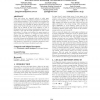588 search results - page 24 / 118 » Social Laws For Agent Modeling |
BCSHCI
2009
13 years 8 months ago
2009
Personal robots and screen agents can be equipped with social abilities to facilitate interaction. This paper describes our research on the influence of these abilities on elderly...
AUSAI
1997
Springer
13 years 11 months ago
1997
Springer
Co-ordination is the glue that binds the activities of autonomous problem-solving agents together into a functional whole. Co-ordination mechanisms for distributed problem-solving ...
ATAL
2007
Springer
13 years 9 months ago
2007
Springer
Modeling crowd behavior is an important challenge for cognitive modelers. We propose a novel model of crowd behavior, based on Festinger’s Social Comparison Theory, a social psy...
ATAL
2007
Springer
2007
Springer
Agent coordination by trade-off between locally diffusion effects and socially structural influences
14 years 1 months ago
There were always two separated methods to make agent coordination: individual-local balance perspective and individualsociety balance perspective. The first method only considere...
JAIR
2008
13 years 7 months ago
2008
In the efficient social choice problem, the goal is to assign values, subject to side constraints, to a set of variables to maximize the total utility across a population of agent...

